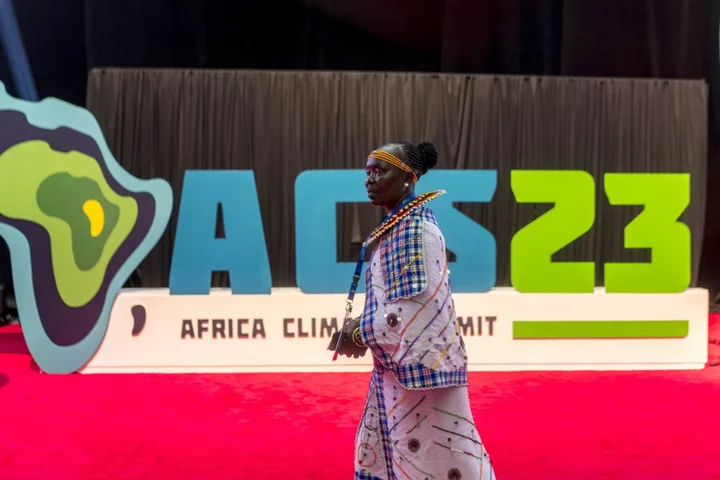The United Arab Emirates, the host of this year’s United Nations climate summit, pledged $4.5 billion to help African nations accelerate clean-energy projects.
Abu Dhabi’s clean-energy producer Masdar, the Abu Dhabi Fund for Development, Etihad Credit Insurance, the nation’s export credit agency, and AMEA Power, a Dubai-based renewable-energy company, will provide the funds, the COP28 Presidency said in a statement on Tuesday.
Africa may need an almost tenfold increase in climate adaptation funding to $100 billion a year to help bolster infrastructure and shield its agriculture from climate change, the Global Center on Adaptation said. While the continent produces only about 4% of the world’s greenhouse gas emissions, its nations are among those hardest hit by climate change.
Read More: UAE Pledges $4.5 Billion to Help Finance Africa Climate Projects
Germany Backs Kenya Hydrogen Among Africa Climate Pledges (Sept. 5, 05:15 a.m.)
Germany will announce €450 million ($486 million) of climate finance pledges at the inaugural Africa climate summit including backing the construction of a fertilizer plant in Kenya using green hydrogen.
Europe’s largest economy will provide a €60 million loan for the Kenyan project in Olkaria, where geothermal energy could be used to split hydrogen from water molecules, providing fuel for the fertilizer plant. It will also cancel €60 million of debt owed to Kenya in exchange for the money being spent on renewable energy and climate-friendly agriculture, according to Barbel Kofler, state secretary to Germany’s economic cooperation minister.
Read More: Germany Backs Kenya Hydrogen Among Africa Climate Pledges
Top Green Fund Backs Deforestation-Free Crops With $189 Million (Sept. 4, 6:11 p.m.)
The world’s biggest global climate fund has approved a $189 million commitment to &Green facility to support agriculture that doesn’t cause deforestation.
The pledge by the $12.8 billion Incheon, South Korea-based Green Climate Fund will target the sustainable production of crops such as cocoa, palm oil, soybeans and rubber in 11 nations without reducing tree cover. Six of the recipients are in Africa — Ivory Coast, Zambia, Liberia, Gabon, the Democratic Republic of Congo and Cameroon — the GCF said in a statement sent to Bloomberg on Monday.
Read More: Top Green Fund Backs Deforestation-Free Crops With $189 Million
First African Offsets Platform Begins With Record Trade (Sept. 4, 5:31 p.m.)
Africa’s first verifiable emissions reduction platform began operations with a carbon futures transaction of more than 2 million credits, a record for offsets issued on the continent.
Nairobi-based CYNK traded the credits, which will be produced by Tamuwa, Kenya’s largest biomass company, it said in a response to questions. Tamuwa’s credits are verified by Gold Standard.
This “showcases the potential for climate projects and sovereign nations in the Global South,” Sudhu Arumugam, CYNK’s chief executive officer, said in a statement on Monday. They can “monetize this fast-growing asset class,” he said.
Read More: First African Offsets Platform Begins With Record Trade (1)
Biggest Mini-Grid Owner in Africa, Asia Sets $500 Million Target (Sept. 4, 5:11 p.m.)
Husk Power Systems, owner of the largest fleet of mini-grids in Africa and Asia, set a target of erecting solar-powered mini-grids in six African nations to bring electricity to 7.7 million people and more than 200,000 small businesses within five years.
The so-called ‘Africa Sunshot’ plan will involve constructing 2,500 grids at a cost of as much as $500 million. The company also separately plans to install more than 150 megawatts of roof-top solar in that time, it said in a statement on Tuesday.
Read More: Biggest Mini-Grid Owner in Africa, Asia Sets $500 Million Target
HSBC-Backed Fund to Invest in African Carbon Credits (Sept. 4, 2:28 p.m.)
Climate Asset Management, a joint venture between HSBC Plc and advisory firm Pollination, seeks to invest about $200 million on behalf of its clients in “nature-based solutions projects that will generate high-quality African carbon credits,” Chief Executive Officer Martin Berg says at the summit.
Ruto Urges Global South and North to Work Together on Climate Change (Sept. 4, 11:10 a.m.)
Efforts to combat climate change should transcend the grievances that pit the so-called Global North against the Global South, and should instead be combined to secure Earth’s ability to sustain life and a future that embraces equality, human security and shared prosperity, Kenyan President William Ruto said.
“The conversation of the north versus south must come to an end,” Ruto said at the Africa Climate summit in the Kenyan capital, Nairobi. “We don’t have the luxury to engage in such a conversation. When the apocalypse happens, it will happen for all us.”
United Nations Environmental Program data shows that while Africa contributed only as much as 3% of global missions, it’s the most vulnerable region in the world to climate change because of low levels of socioeconomic growth. The human toll of changing weather patterns heightens the urgency to address loss and damage, and to configure appropriate financial mechanisms to address climate-induced insecurity, Ruto said.
--With assistance from Eric Ombok.

